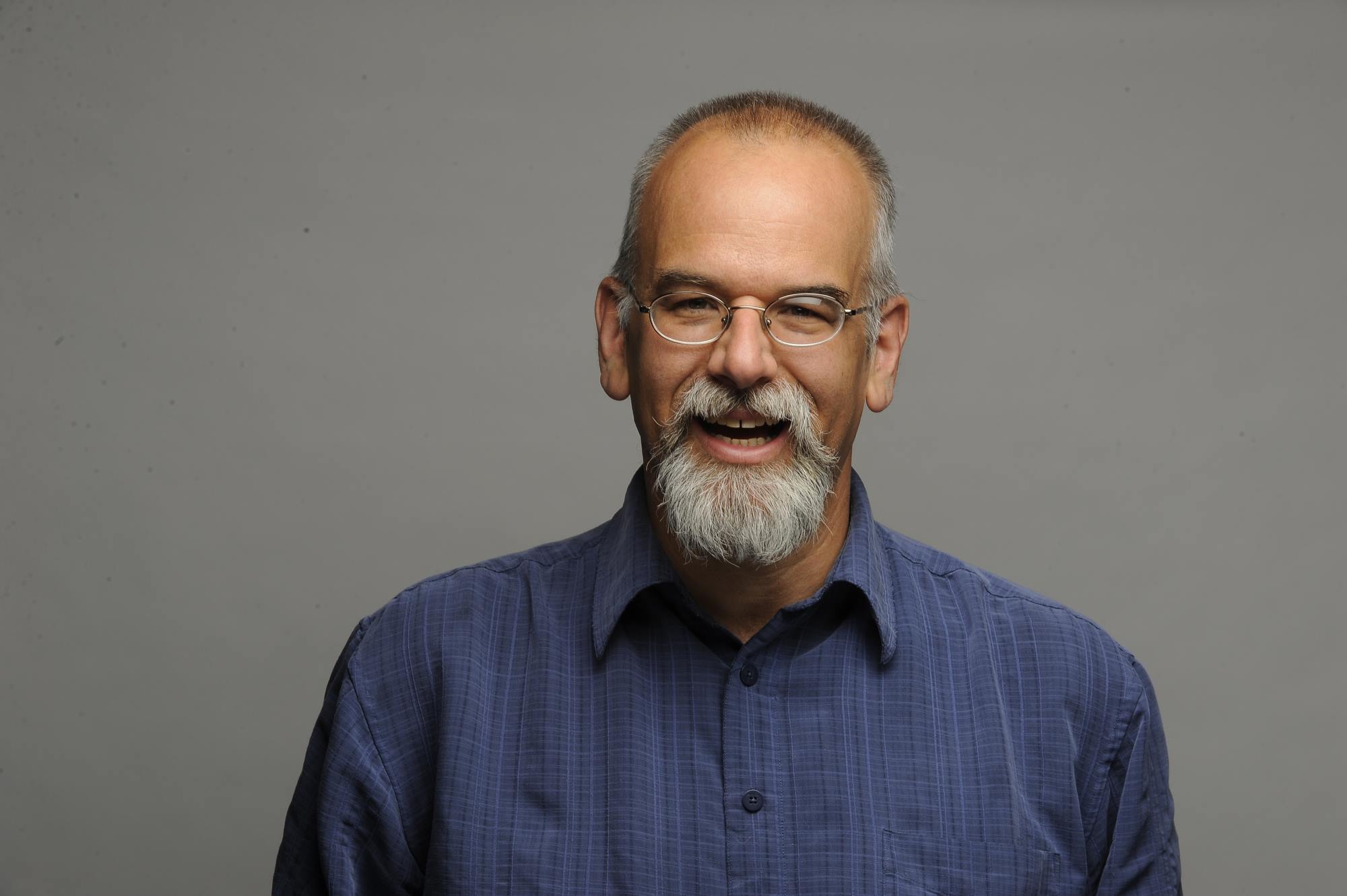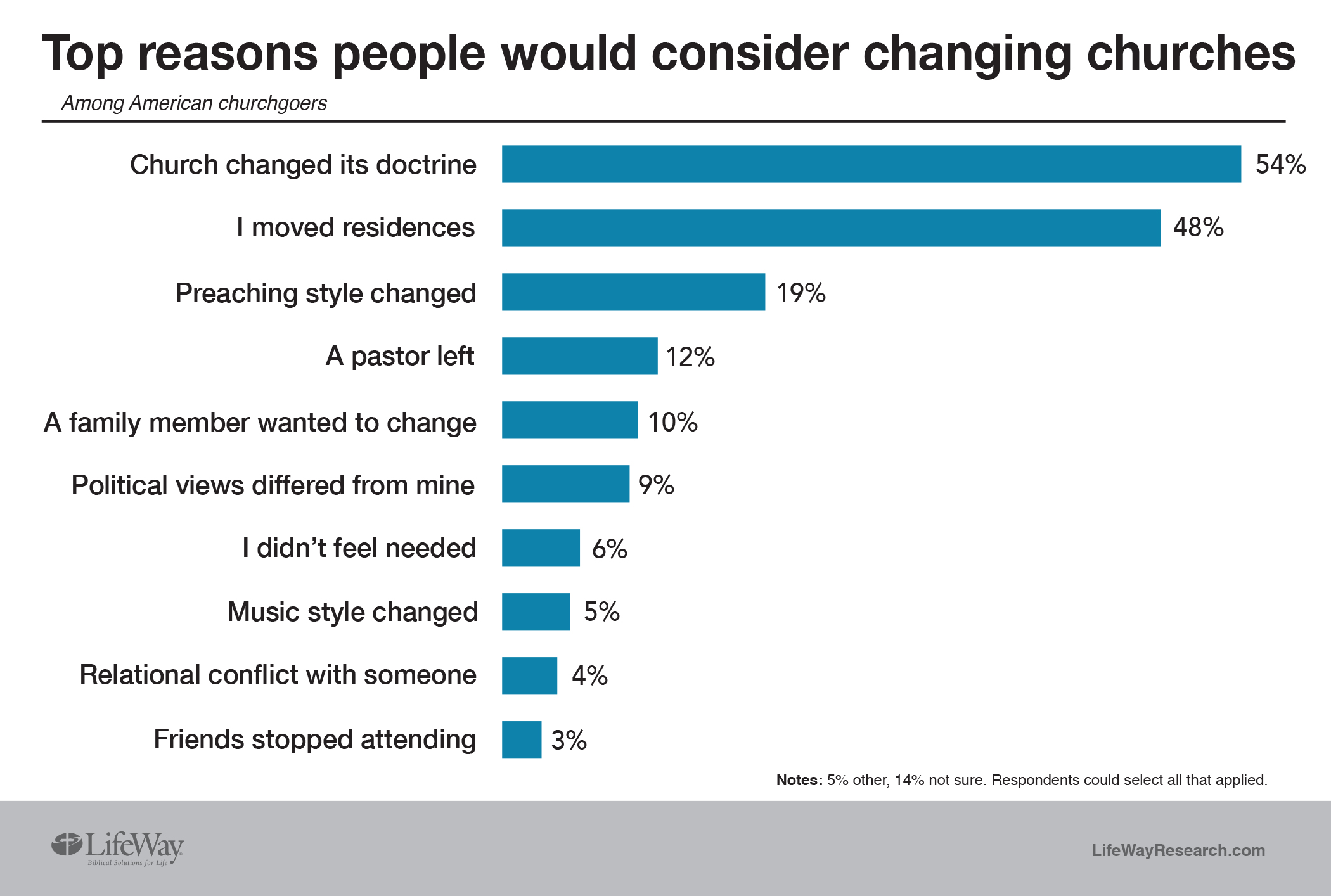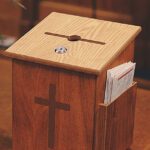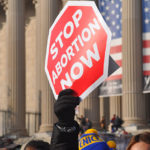Most churchgoers are committed to staying. But more than half say they would strongly consider leaving if the church’s beliefs changed.
By Bob Smietana
Most churchgoers will put up with a change in music style or a different preacher.
But don’t mess with a church’s beliefs or there may be an exodus, according to a new study from Nashville-based Lifeway Research.
The study of Protestant churchgoers found most are committed to staying at their church over the long haul. But more than half say they would strongly consider leaving if the church’s beliefs changed.
Pastors often worry about changing church music and setting off a “worship war,” said Scott McConnell, executive director of Lifeway Research. But few say they would leave over music.
Churchgoers are much more concerned about their church’s beliefs.
“Mess with the music and people may grumble,” he said. “Mess with theology and they’re out the door.”
Churchgoers stay put
Lifeway Research surveyed 1,010 Protestant churchgoers—those who attend services at least once a month—to see how strongly they are tied to their local congregations.
Researchers found most churchgoers stay put.
Thirty-five percent have been at their church between 10 and 24 years. Twenty-seven percent have been there for 25 years or more. Twenty-one percent have been there less than five years, while 17 percent have been at the same church for between five and nine years.
Lutherans (52 percent), Methodists (40 percent) and Baptists (31 percent) are most likely to have been at their church for 25 years or more. Fewer nondenominational (11 percent) or Assemblies of God/Pentecostal churchgoers (13 percent) have such long tenure.
“Most church members have been at their church longer than their pastor,” said McConnell.
More than half (57 percent) of churchgoers say they are completely committed to continuing to attend their current church. About a quarter (28 percent) are “very much” committed, while 11 percent are moderately committed. Two percent are slightly committed, while 1 percent are not committed at all.
The more people go to church, the more committed they are to attending their same church in the future. Those who attend at least once a week are twice as likely to be completely committed to attending their church (62 percent) than people who go once or twice a month (31 percent). Those who attend once or twice a month are more likely to be moderately committed (36 percent) than those who go at least once a week (7 percent).
Churchgoers with evangelical beliefs are more likely to be completely committed (67 percent) than those who don’t have evangelical beliefs (45 percent). Baptists (60 percent) are more likely to be completely committed than Lutherans (47 percent).
About two-thirds (63 percent) of churchgoers who are 65 or older are completely committed to attending their same church in the future. That drops to 50 percent for those younger than 35.
Older churchgoers are also least likely to want to leave their church. When asked if they’ve thought about going to another church in their area, 92 percent of those 65 or older say no.
Overall, 15 percent of churchgoers say they have thought about going to another church in the past six months. Eighty-five percent say they have not.
Of those thinking about going to another church, about half (54 percent) have already visited another church. Forty-six percent have not.
“If people are thinking about leaving your church, chances are they’ve already started looking,” said McConnell. “So they’re probably halfway out the door.”
Most feel their beliefs line up with the church
For the most part, churchgoers say they agree with their church’s teaching. About half (52 percent) say their beliefs are completely aligned with those of the church. Forty-two percent say their beliefs are mostly aligned. Fewer than 3 percent say their beliefs are slightly aligned, not aligned or they don’t know their church’s beliefs.
Education plays some role in how churchgoers view their church’s theology. Churchgoers who have graduate degrees are less likely to accept all their church’s teachings. Only a third (35 percent) say their beliefs are completely aligned with those of the church. Sixty percent say their beliefs are mostly aligned.
Two-thirds (62 percent) of churchgoers who have evangelical beliefs say they are completely aligned with their church’s theology, while a third are mostly aligned. By contrast, 39 percent of churchgoers who don’t have evangelical beliefs say they are completely aligned, and about half (53 percent) are mostly aligned.
Sixty percent of churchgoers at big churches—those with more than 1,000 attenders—say they are completely aligned with their church’s theology. That drops to 46 percent at churches with fewer than 50 attenders.
Baptists (57 percent) and nondenominational churchgoers (61 percent) are more likely to say they are completely aligned with their church’s theology than Lutherans (43 percent) or Methodists (25 percent).
Still, churchgoers don’t like to see changes in their church’s doctrine. More than half (54 percent) say they’d seriously consider leaving if church doctrine changed.
Researchers asked about other factors that might cause churchgoers to switch churches. Nearly half (48 percent) would change churches if the churchgoer moved to a new home.
Some churchgoers would leave if the preaching style changed (19 percent), if the pastor left (12 percent) or if a family member wanted a new church (10 percent). Nine percent say they would leave over politics. Fewer would leave if they didn’t feel needed (6 percent), if the music style changed (5 percent), if they had a conflict (4 percent) or if a friend stopped attending (3 percent).
The survey shows churchgoers care about doctrine, said McConnell.
“Still, pastors can’t assume everyone in the pews agrees with their preaching,” McConnell said. “Overall, 94 percent believe most or all of their church’s teaching. But there’s still substantial wiggle room.
“Every time a pastor gets up to preach, there’s a good chance more than a few people in the pews are going to disagree,” he said.
Most find church programs helpful
Researchers also looked at how effective churches are in helping people grow spiritually.
Most churchgoers think their church is doing a good job. Three-quarters (76 percent) think their church has been either extremely helpful (36 percent) or very helpful (40 percent) in their spiritual growth. Sixteen percent say the church is moderately helpful.
Relatively few say the church has not been helpful (1 percent) in their spiritual growth or are not sure (2 percent).
Churchgoers did have some suggestions on ways churches can help them grow. Among them:
- 27 percent want their church to help them understand more about God and the Bible.
- 20 percent want their church to help them find new ways to serve.
- 19 percent want their church to provide more Bible study groups.
- 16 percent want their church to help them get to know more people in church.
- 14 percent say their church could provide forums to answer their spiritual questions.
- 13 percent want their church to give them more chances to serve.
- 13 percent want their church to provide worship experiences that fit their needs.
- 9 percent want their church to provide more interaction with the pastor.
- 8 percent want their church to provide them with a mentor.
Even though most churchgoers are staying put and are relatively happy, there’s some reason for concern, McConnell said.
At any given church, about 15 percent of the congregation is thinking about leaving. If they go, the church could suffer.
“The average church in the United States has less than 100 attenders,” McConnell said. “Losing 10 or 15 people could make a huge impact.”

Bob Smietana
Bob is the former senior writer for Lifeway Research. In September 2018, he joined Religion News Service, where he currently serves as a national writer.
Methodology:
Lifeway Research conducted the study Aug. 22–30, 2017. The survey was conducted using the web-enabled KnowledgePanel®, a probability-based panel designed to be representative of the U.S. population. Initially, participants are chosen scientifically by a random selection of telephone numbers and residential addresses. People in selected households are then invited by telephone or by mail to participate in the web-enabled KnowledgePanel®. For those who agree to participate but do not already have internet access, GfK provides at no cost a laptop and ISP connection.
For this survey, a nationally representative sample of U.S. Protestant and nondenominational adults (18 and older) who attend religious services once a month or more often was selected from the KnowledgePanel®.
Sample stratification and base weights were used for gender, age, race/ethnicity, region, metro/non-metro, home ownership, education and income to reflect the most recent U.S. Census data. Study-specific weights included for gender by age, race/ethnicity, region and education to reflect GSS 2016 data. The completed sample is 1,010 surveys. The sample provides 95 percent confidence that the sampling error does not exceed plus or minus 3.1 percentage points. Margins of error are higher in sub-groups.
Evangelical beliefs are defined using the NAE/Lifeway Research Evangelical Beliefs Research Definition based on respondent beliefs. Respondents are asked their level of agreement with four separate statements using a four-point, forced-choice scale (strongly agree, somewhat agree, somewhat disagree, strongly disagree). Respondents are categorized as having evangelical beliefs if they strongly agree with all four statements:
- The Bible is the highest authority for what I believe.
- It is very important for me personally to encourage non-Christians to trust Jesus Christ as their Savior.
- Jesus Christ’s death on the cross is the only sacrifice that could remove the penalty of my sin.
- Only those who trust in Jesus Christ alone as their Savior receive God’s free gift of eternal salvation.
Lifeway Research is a Nashville-based, evangelical research firm that specializes in surveys about faith in culture and matters that affect churches.













